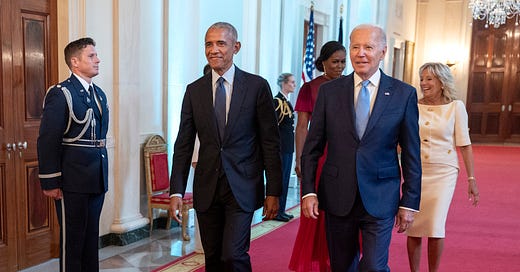Dear readers,
With President Biden’s political fortunes on the upswing, there’s been a little bit of a rush to get people’s “Joe Biden shouldn’t run again” takes out the door before they start to feel really, really implausible. Here’s Ross Barkan arguing in New York magazine that Joe Biden’s successes give him an opportunity to “quit while he’s ahead,” while A.B. Stoddard argues at The Bulwark that the Democratic Party would benefit from having a “spirited, open” primary full of big ideas about the party’s future (what could go wrong?).
As you know, this shit drives me up a wall. Incumbents seek re-election for a reason: They tend to win, and they are the best-positioned people to make the case that a governing party is succeeding and deserves re-election. And the arguments for Biden to step aside — that he’s too old and tired and out of touch — invariably come from people who believed all those things in 2019 and 2020, and believed they were reasons he could not win a Democratic presidential primary. He’s already proved them wrong and, nevertheless, they persist.
Plus, if Biden doesn’t run again, the likelihood is that Kamala Harris will end up as the Democratic nominee, and she is a weaker and less appealing candidate than he is, despite his advanced age — remember, they ran against each other not very long ago, when he was already very old, and his campaign went a lot better than hers did.
Lord knows I’ve had my criticisms of Biden, especially when he’s allowed himself to be dragged along with the fashions of the Democratic Party’s institutional activist class — issuing doomed executive orders to shut them up, pushing the Democratic Senate caucus into circular firing squads to shut them up, finding some cockamamie legal rationale to cancel hundreds of billions of dollars of debt to shut them up, and so on. But he still understands the electorate better than almost any other major Democratic politician. Better than Bernie Sanders, better than Elizabeth Warren, better than Hillary Clinton, better than Barack Obama. Maybe not better than Amy Klobuchar, but then, he has a deep well of support in the black community and she doesn’t. He is still irreplaceable, which is a pretty serious knock on the party, but in any case, that means it’s a bad idea to replace him before you absolutely have to.
This week’s podcast — and yes, we’re back from hiatus — is with Gabriel Debenedetti, national correspondent for New York magazine, whose new book comes out Tuesday. It’s called The Long Alliance: The Imperfect Union of Joe Biden and Barack Obama, and it’s about their two-decade relationship — far more complex than the bromance of political narrative — that has shaped American politics in the 21st century.

One of the more painful episodes in that relationship came during Obama’s second term, when Obama — along with most of the institutional Democratic Party — reached the conclusion that Hillary Clinton would be a stronger candidate than Biden to succeed him. Without explicitly endorsing, Obama worked behind the scenes to set Hillary up on a glide path to nomination, effectively boxing Biden out. The party establishment’s decision to go with Hillary wasn’t just wrong, it was disastrous: If Biden had been nominated in 2016, there would never have been a Trump presidency.
Now, as I just noted, Obama was far from alone in his failure to understand Biden’s true strengths or Clinton’s glaring weaknesses, but that only goes to show how vital Biden is to the party: He gets something about what alienates non-college educated voters (not just non-college educated white voters) that so many other leaders in the party do not. Joe from Scranton would not have glibly assumed that for every voter Hillary lost in rural Pennsylvania, she’d pick up two in the Philadelphia suburbs. And Joe fixated on something that most Democrats glossed over but that seems obvious in retrospect: Too many voters did not trust Clinton after decades of scandal, and that was going to cost her.
Here’s how Gabe put it in our interview, describing Biden’s private venting during the 2016 campaign:
He's saying to anyone who will listen: No one trusts her. This is a huge problem. He is a big consumer of polls at that time, and he sees her trustworthy numbers as a huge issue. At one point, David Simas, who is Obama's political director, sits him down and says, Listen, you've got to stop talking about this. It's true that she has low trustworthy numbers, but so does Trump. That's not what this election is going to be decided upon.
As soon as the election is over, I think two days after the election, Biden sees David Simas outside of the West Wing, looks him in the eyes and says, Trust doesn't matter, huh? and then keeps walking.
This kind of clarity — which is rarer than it ought to be — is why the party still needs Biden. And it’s one of the reasons Obama needed Biden.
Of course, Biden needed Obama, too. Without a ride on Obama’s “hope and change” train, Biden could never have become the party’s presidential nominee. As Gabe describes in the book, the experience of serving as vice president led Biden to remake his self image. It turned him into a stronger, more disciplined politician than he had been, even after decades in the Senate. And in Obama’s post-presidency, Biden has continued to lean on him as a trusted adviser and even a quasi-therapist, even as Obama has largely and purposefully retreated from most public debates.
I recommend Gabe’s book — I learned a lot — and I hope you enjoy our interview, which also covers Biden's reputation for gaffes and his newsmaking interview endorsing gay marriage before Obama did; and Biden's relationship with his own vice president, Kamala Harris.
Very seriously,
Josh
Episode links and references
Click here for a transcript of this episode.
An excerpt of Gabe’s book in New York Magazine and his reporting on the search for another 2024 candidate within the Democratic Party.
David Gregory’s interview with then-Vice President Biden on ‘Meet The Press’ when Gregory asked Biden about same-sex marriage.













Share this post